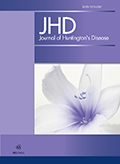Authors: Mazarakis, Nektarios K. | Mo, Christina | Renoir, Thibault | van Dellen, Anton | Deacon, Robert | Blakemore, Colin | Hannan, Anthony J.
Article Type:
Research Article
Abstract:
Background: Huntington's disease (HD) is caused by a tandem repeat expansion and involves progressive cognitive decline, psychiatric abnormalities and motor deficits. Disease onset and progression in HD mice can be substantially delayed by a housing environment with enhanced sensorimotor and cognitive stimulation. However, the proposed benefits of environmental enrichment (EE) are always taken in the context of ‘deprived’ standard housing and investigation is warranted into the graded effects of enrichment. Objective: To assess if a higher level of environmental stimulation (‘super-enrichment’) has additional benefits compared to home-cage EE in HD mice. Methods: One group of R6/1 transgenic HD mice and
…wild-type (WT) littermates were home-cage enriched (EE group). A second group also had enriched home cages, but from 6 weeks of age were exposed to a large ‘super-enrichment’ arena (SuperE group) three times per week. A range of motor tests (open field, rotarod, clasping) were conducted from 8 weeks of age and, at the end of the experiment, grip strength was assessed and post-mortem measures were taken (brain weight, striatal volume, dopamine receptor activation and aggregate density). Results: SuperE improved the reduction of exploration in the open field, ameliorated impaired grip strength in home-cage enriched HD mice and delayed, but did not abolish, the onset of rear-paw clasping compared to EE. SuperE increased brain weight compared to EE in HD mice and reduced striatal dopamine D1 receptor agonist-induced c-fos expression, regardless of genotype. Body weight, rotarod performance, aggregate formation and striatal volume in SuperE groups were no different compared to EE groups. Conclusions: The beneficial effects of sensorimotor and cognitive stimulation are graded and extend beyond merely compensating for the deprivation of standard home cages in specific motor-related phenotypes in HD. Our findings highlight the importance of environmental enrichment quality and quantity and the translational value of stimulating living conditions as experience-dependent modulators of pathogenesis in HD and other brain disorders.
Show more
Keywords: Cerebral cortex, cognitive stimulation, dopamine, environmental enrichment, experience-dependent plasticity, neurodegeneration, physical activity, polyglutamine, striatum, tandem repeat disorder
DOI: 10.3233/JHD-140118
Citation: Journal of Huntington's Disease,
vol. 3, no. 3, pp. 299-309, 2014
Price: EUR 27.50





